|
Looking back
Simple acts... Great discoveries
Who was asked to leave school, but
went on to make one of the greatest discoveries in science?
Albert Einstein who was born in Germany in 1879 and died in the
United States in 1955. Even though he is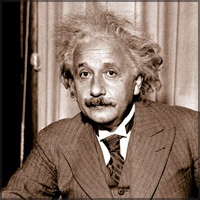 revered as the greatest scientist in the world today, his teacher asked
him to leave school saying he would never amount to anything. In fact,
Einstein was not someone who excelled in his studies. He was weak at
most of his subjects except one - mathematics.
revered as the greatest scientist in the world today, his teacher asked
him to leave school saying he would never amount to anything. In fact,
Einstein was not someone who excelled in his studies. He was weak at
most of his subjects except one - mathematics.
The so-called backward schoolboy became a genius when his two
theories, special theory of relativity and general theory of relativity
were proved right by scientific research and experiments.
The two theories revolutionised physics by presenting new ways of
understanding fundamental aspects as mass, energy, gravity and time. His
theories led to many modern developments in science, which includes
nuclear power and our understanding of black holes.
****
Who believed everything worked by
numbers?
Pythagoras, who lived in ancient Greece around 500 BC. He was
convinced that the entire universe is governed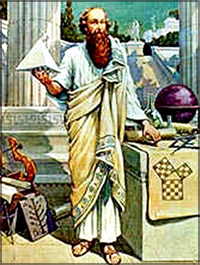 by numbers.
by numbers.
He became one of the earliest great scientists when he made the
famous discovery that musical notes which are in harmony, are given by
pipes or strings whose lengths are in simple numerical proportions such
as 3:2 or 4:3.
This discovery gave rise to the belief that simple mathematical
relationships underlie everything and can explain everything.
***
Who saw immense power in a kettle
of water?
James Watt, the great British engineer. It is said that as a child,
he noticed that steam in a boiling kettle repeatedly lifted the lid.
Perhaps this inspired him to improve the steam engine in the 1760s,
making it an effective source of power. James Watt's prototype steam
engine was called the 'Old Bess'.
***
Who used his imagination to become
a great scientist, even though he was useless at maths?
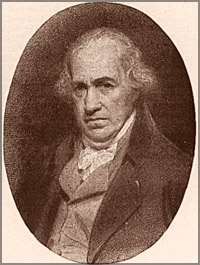 British
chemist and physicist, Michael Faraday who lived from 1791 to 1867. British
chemist and physicist, Michael Faraday who lived from 1791 to 1867.
For more than 400 years in the past, most discoveries and inventions
were made by scientists using mathematics or applying scientific laws.
However, Faraday, the son of a poor blacksmith who received no education
beyond reading and writing, used his imagination to make a great
discovery. Faraday was very inquisitive and taught himself all about
science. As he was also imaginative, it enabled him to gain great fame
through his lectures on science.
His inquisitiveness led him to investigate electric current and its
uses which was new to science in the early 1800s. Faraday couldn't
express his work in mathematical terms, but he used his imagination to
picture how electricity works.
He visualised that a wire carrying an electric current is surrounded
by lines of magnetic force produced by the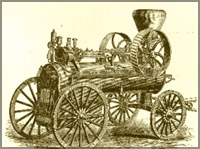 flow of the current. He used this idea to find out how electricity and
magnetism are linked. In 1821, he built the first working model of an
electric motor and ten years later, the first electric generator. He
didn't stop there. Faraday went on to show how electricity affects
chemical substances.
flow of the current. He used this idea to find out how electricity and
magnetism are linked. In 1821, he built the first working model of an
electric motor and ten years later, the first electric generator. He
didn't stop there. Faraday went on to show how electricity affects
chemical substances.
These great discoveries made by a man (who today would not be able to
pass science examinations) have enabled us to generate and use electric
current for our benefit.
***
Who risked being struck by
lightning to make a great discovery?
The famous American scientist and statesman Benjamin Franklin who
lived in 1752. He carried out a dangerous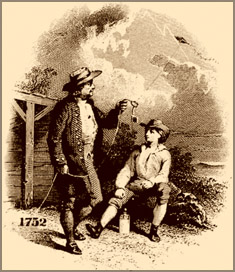  experiment which has helped save thousands of lives today.
experiment which has helped save thousands of lives today.
In order to prove that lightning is electricity, he flew a kite, the
string of which was connected to an electricity detector, up into a
thunderstorm. Soon the electricity started to follow down the string to
the ground.
Based on this discovery, he went on to invent the lightning
conductor, which is so useful especially when there is stormy weather
with heavy lightning.
****
Who predicted that radio, other
waves and rays exist?
Before 1800, only light was known, as all other rays and waves are
invisible. It was in 1800 and 1801 that infrared and ultraviolet rays
were discovered.
No one was aware of the existence of any other waves and rays until
the British physicist, James Clerk Maxwell worked out the nature of
light rays in the 1860s. He showed that they consist of electric and
magnetic fields.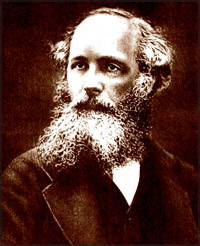 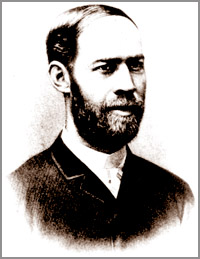 He called light an electromagnetic radiation.
He called light an electromagnetic radiation.
Maxwell predicted that other kinds of electromagnetic radiation must
exist based on what was discovered so far. He was proved right. Inspired
by his teachings, the German scientist, Heinrich Hertz, first generated
radio waves in 1881. Other waves and rays were discovered later.
Radio and radar waves, microwaves, ultraviolet rays, light rays,
infrared rays, X-rays and gamma rays all form what is called the
electromagnetic spectrum. They are all various kinds of radiant energy;
they only differ in their wavelength and frequency.
Those with long wavelengths are generally called waves and the
shorter ones are known as rays. All electromagnetic rays travel through
space at the speed of light, but differ in frequency and wavelength.
***
Who made a famous discovery in his
bath?
Archimedes, the renowned Greek scientist who lived from about 287 to
about 212 BC.
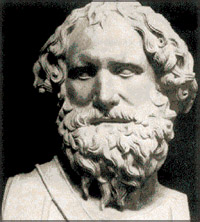 The
story goes that he was asked to find out whether the king's crown was
made of pure gold or of gold mixed with other valuable metal. It seemed
an impossible task, but one day, preoccupied with the task entrusted to
him, he filled his bath too full, and the water overflowed the moment he
got into the bath. The
story goes that he was asked to find out whether the king's crown was
made of pure gold or of gold mixed with other valuable metal. It seemed
an impossible task, but one day, preoccupied with the task entrusted to
him, he filled his bath too full, and the water overflowed the moment he
got into the bath.
Immediately, Archimedes realised the solution to determine if the
crown was pure gold or not, and rushed out into the streets, naked,
shouting, 'Eureka' which in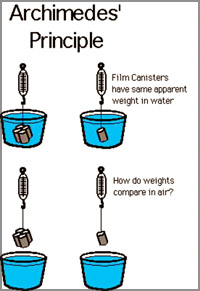 Greek means 'I've got it'.
Greek means 'I've got it'.
We still use this word to signify an astounding discovery. What
Archimedes discovered was comparative densities. When the water in the
bath overflowed as he got in, he realised the same thing would happen if
the crown was put in the water.
He measured how much water the crown displaced and then checked to
see if a piece of pure gold having the same weight as the crown
displaced the same amount of water. In fact, the king's crown displaced
more water, proving that it was mixed with a less dense metal.
It was a triumph for the Greek scientists, but tragedy for the
goldsmith who ended up being executed for cheating the king. |
